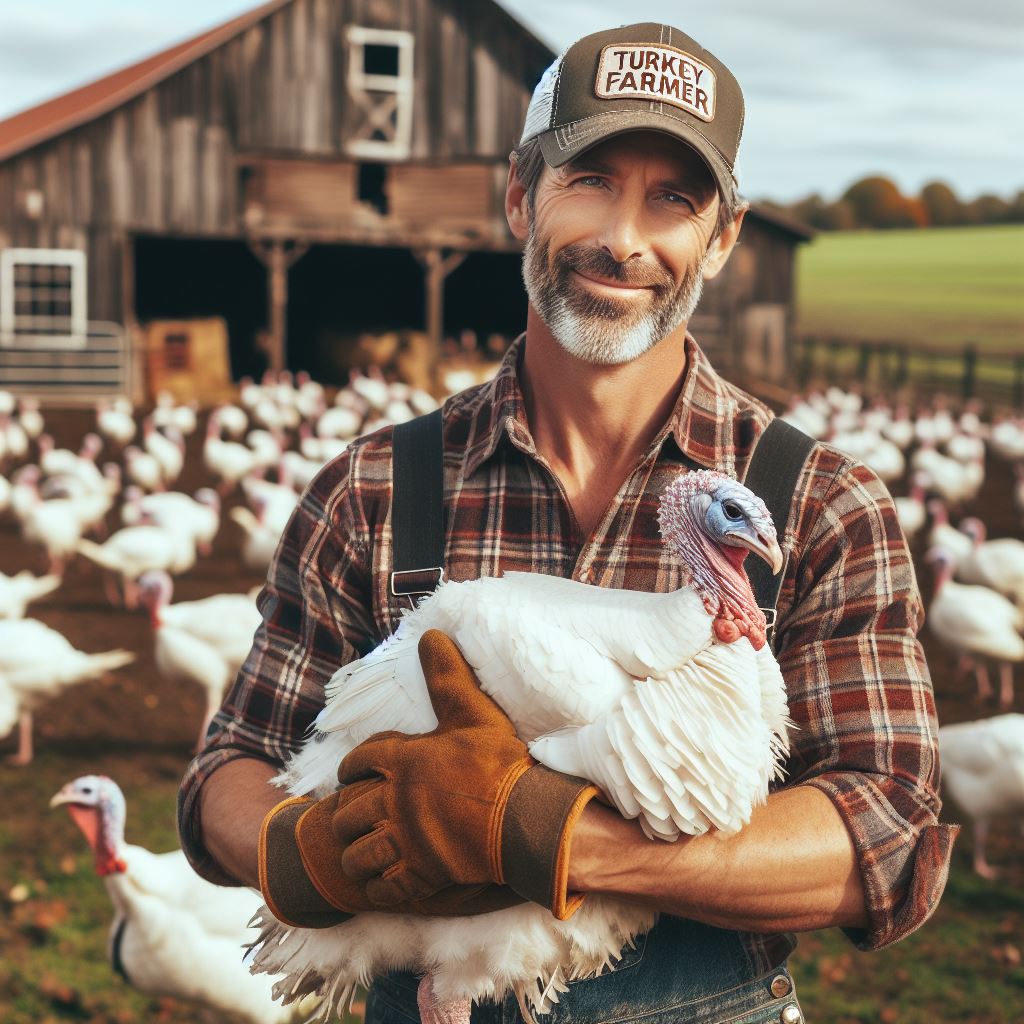Turkey Rearing 101: Basics for Beginners
Last Updated on January 22, 2024
Introduction
Rearing turkeys is important for beginners as it offers various benefits and opportunities.
In this blog post, we will cover essential aspects such as selecting the right breed, providing proper housing and nutrition, and managing common health issues.
With these guidelines, beginners can embark on turkey rearing with confidence and maximize their chances of success.
So, let’s delve into the basics of turkey rearing!
Benefits of Rearing Turkeys
Turkeys are not just for Thanksgiving.
Raising turkeys can bring numerous advantages, both for your health and your wallet.
Here are some benefits you can enjoy by starting your own turkey farm:
The advantages of raising turkeys
- Sustainable Meat Source: By rearing your own turkeys, you can have a sustainable and reliable meat source right in your backyard.
- Fresh & Chemical-Free Meat: Home-reared turkeys are free from harmful chemicals and additives, ensuring you consume healthy and natural meat.
- Control Over Diet & Living Conditions: Rearing turkeys allows you to control what they eat and ensure they live in comfortable and humane conditions.
- Educational Experience: Raising turkeys can be a fantastic learning opportunity for children and adults alike, teaching them about responsibility, animal care, and self-sufficiency.
- Personal Satisfaction: The satisfaction of nurturing and raising healthy turkeys from chicks to mature birds is truly rewarding.
Health benefits of consuming home-reared turkeys
- Lean & Nutritious Meat: Turkey meat is naturally low in fat and high in protein, making it a great choice for a healthy diet.
- Rich in Essential Nutrients: Turkey is a good source of essential nutrients like vitamins B6 and B12, zinc, potassium, and selenium.
- Lower Antibiotic Consumption: Commercially raised turkeys often receive antibiotics, but by rearing your own, you can avoid unnecessary antibiotic intake.
- Avoiding Hormones & Additives: Home-reared turkeys are free from growth hormones and artificial additives commonly found in commercially raised birds.
- Reduced Risk of Contaminants: By knowing exactly how your turkeys are raised, you can minimize the risk of contamination, such as salmonella.
Generating income through turkey farming
- Turkey Sales: As your flock grows, you can sell turkeys to local customers, restaurants, or even consider starting your own small-scale turkey farm.
- Thanksgiving Market: Turkeys are in high demand during the Thanksgiving season, creating an opportunity to generate extra income.
- Value-Added Products: Aside from selling whole turkeys, you can generate additional income by offering turkey-based products like sausages or deli meats.
- Feathers & By-Products: Turkey feathers can be sold to crafters and artisans, and by-products like turkey manure can be used as fertilizer or sold to gardeners.
- Agritourism Potential: A well-managed turkey farm can attract visitors interested in learning about turkey rearing, offering tours or workshops for a fee.
Rearing turkeys can be a rewarding endeavor, providing you with sustainable meat, health benefits, and even an additional income stream.
Whether you start small or aspire to expand, the advantages of turkey farming are hard to ignore.
Embrace the joys and benefits of turkey rearing for a fulfilling and successful farming experience.
Choosing the Right Turkey Breed
Choosing the right turkey breed is a crucial step in turkey rearing for beginners.
The breed you select will determine not only the turkey’s appearance but also its size, temperament, and suitability for your specific needs.
In this section, we will provide an overview of different turkey breeds, factors to consider when selecting a breed, and specific recommendations for beginners.
Overview of Different Turkey Breeds
Broad Breasted White
This is the most common commercial breed, known for its large size and fast growth rate.
It has white feathers and a broad, plump body.
Bronze
Bronze turkeys are a heritage breed with rich, reddish-bronze feathers.
They are known for their flavorful meat and excellent foraging skills.
Narragansett
This breed has grayish-brown feathers with black and white bars on their plumage.
They are docile and well-adapted to free-range conditions.
Royal Palm
Royal Palm turkeys are known for their striking appearance, with white feathers and black edging.
They are small to medium-sized and make great pets.
Bourbon Red
This breed has beautiful mahogany-red feathers and is known for its calm temperament.
They are good foragers and produce flavorful, tender meat.
Factors to Consider When Selecting a Breed
Space and Housing
Consider the size of your available space and the type of housing you can provide.
Some breeds require more space and specific shelter requirements.
Purpose
Determine your purpose for raising turkeys – whether it is for meat, eggs, or exhibition.
Different breeds excel in different aspects, so choose accordingly.
Climate and Environment
Consider the climate and environment in which you live.
Some breeds are more tolerant of cold or hot temperatures, while others thrive in specific regions.
Temperament
Evaluate the temperament of different breeds.
Some are more docile and friendly, making them suitable for families, while others may be more aggressive.
Care and Maintenance
Consider the level of care and maintenance required for each breed.
Some breeds have specific health or dietary needs that may require extra attention.
Specific Recommendations for Beginners
- Beginners are advised to start with the Broad Breasted White breed due to its ease of care and rapid growth.
- If you prioritize flavor, consider the Bronze or Bourbon Red breeds for their delicious meat.
- For beginners looking for a visually appealing breed, the Royal Palm is an excellent choice.
- If you have limited space or live in an urban area, consider smaller breeds like the Royal Palm or Narragansett.
- If you plan to raise turkeys as pets, the Royal Palm’s friendly and docile temperament make it a great option.
In essence, choosing the right turkey breed is essential for beginners embarking on turkey rearing.
Consider factors such as space, purpose, climate, temperament, and care requirements when selecting a breed.
For beginners, breeds like Broad Breasted White, Bronze, Royal Palm, Narragansett, and Bourbon Red offer specific advantages.
Make an informed decision to ensure a successful and enjoyable turkey rearing experience.
Setting Up a Suitable Turkey Environment
Requirements for shelter and space
- Provide a spacious shelter for turkeys to roam and take shelter from extreme weather conditions.
- Ensure the shelter has enough space for each turkey to move comfortably without overcrowding.
- Construct the shelter with sturdy materials to protect the turkeys from predators and harsh elements.
- Install doors and windows that can be opened or closed to regulate temperature and airflow.
- Use fencing or electric netting to create a secure outdoor space for turkeys to roam during the day.
Providing proper ventilation and insulation
- Ensure proper ventilation in the turkey shelter to maintain fresh air and prevent the accumulation of harmful gases.
- Install windows or vents at both the top and bottom of the shelter to promote air circulation.
- Use fans or exhaust systems to enhance air movement, especially during hot summer months.
- Insulate the walls and roof of the turkey shelter to regulate temperature and prevent drafts.
- Consider using natural insulation materials, such as straw or hay, for an eco-friendly option.
Suggested flooring options for turkey rearing
- Use litter flooring, such as straw, wood shavings, or rice hulls, which provide a comfortable surface for turkeys.
- Avoid using concrete flooring as it can cause foot and leg problems in turkeys.
- Ensure the litter is kept dry and clean to prevent the growth of harmful bacteria.
- Consider using wire mesh flooring in areas where turkeys walk the most to keep their feet clean.
- Regularly replace and clean the litter to maintain hygiene and prevent diseases.
By following these guidelines, you can create a suitable environment for rearing turkeys, ensuring their health, comfort, and overall well-being.
Providing adequate space, proper ventilation, and suitable flooring options are essential factors in the successful rearing of turkeys.
Remember to regularly monitor and maintain the turkey environment to address any issues promptly and provide the best conditions for your turkeys.
Feeding and Nutrition
Feeding turkeys properly is crucial for their growth and overall health.
Here are the essential aspects to consider:
Nutritional requirements for turkeys at different stages
- Poults (young turkeys) require a high-protein diet, about 28-30%, for their rapid growth.
- Growing turkeys need a slightly lower protein content, around 23-26%, to support their development.
- Adult turkeys only need about 16-18% protein in their diet.
Types of feed and supplements
- Starter feeds are specially formulated for poults and contain a higher protein content.
- Grower feeds are designed for growing turkeys and have a slightly lower protein percentage.
- Finisher feeds, with lower protein levels, are suitable for adult turkeys.
- Supplements like vitamins, minerals, and probiotics can enhance the turkeys’ health and immunity.
Recommended feeding schedule
- Poults require small and frequent meals, around four to six times a day, for the first few weeks.
- From 8-20 weeks of age, feed the growing turkeys twice a day in appropriate portion sizes.
- Adult turkeys can be fed once a day, providing the required amount of feed based on their weight.
To ensure effective feeding and nutrition, follow these guidelines:
- Provide fresh and clean water at all times, turkeys consume significant amounts of water, especially in hot weather.
- Keep the feeding area clean and dry to prevent the growth of harmful bacteria or mold.
- Use a feeding trough or pan that is appropriate for the size of the turkeys and can accommodate all of them comfortably.
- Monitor the turkeys’ body condition. Adjust their feed intake accordingly to avoid excessive weight gain or loss.
- Gradually introduce any new feed or supplements to prevent digestive disturbances.
- Choose commercial feeds from reputable brands to ensure the right nutritional balance.
- Regularly check the expiration dates of feeds and supplements to guarantee their freshness and effectiveness.
- If using homemade feed, consult an expert to ensure it meets all the required nutritional standards.
When it comes to feeding turkeys, the quality and quantity of the feed are crucial for their well-being.
Providing a well-balanced diet throughout different stages of their life is essential for their growth, immune system, and reproductive health.
Remember that proper nutrition directly affects the turkeys’ productivity and the profitability of your turkey-rearing venture.
By giving them the right nutrients and fulfilling their nutritional requirements, you can maximize your turkeys’ potential and ensure their overall welfare.
Read: Poultry Diseases: Prevention & Care Tips
Health Management
In order to ensure the well-being of your turkeys, it is important to implement proper health management practices.
Here are some essential measures to consider:
Preventive measures against common turkey diseases
- Keep the turkey house clean and well-ventilated to prevent the spread of diseases.
- Quarantine new turkeys for at least two weeks to prevent introducing infections into the flock.
- Practice strict biosecurity measures, including limiting visitors, disinfecting equipment, and using footbaths.
- Provide a balanced and nutritious diet to boost the turkeys’ immune system.
Regular health check-ups and vaccinations
Regular health check-ups are crucial for the early detection and prevention of diseases in turkeys.
Additionally, vaccinations can play a vital role in protecting your flock.
Here are some key points:
- Consult a veterinarian to develop a comprehensive health check-up schedule for your turkeys.
- Ensure proper vaccination of turkeys against common diseases like fowl cholera, avian influenza, and Newcastle disease.
- Follow the recommended vaccination schedule to provide optimal protection to your turkeys.
- Keep records of all vaccinations and health check-ups to track the health status of your flock.
Identifying and addressing health issues
Observing and addressing health issues promptly is essential for maintaining the overall well-being of your turkeys.
Here are some tips:
- Regularly observe the behavior and appearance of your turkeys to detect any signs of illness.
- Isolate and treat sick turkeys immediately to prevent the spread of diseases within the flock.
- Consult with a veterinarian to accurately diagnose and treat health problems.
- Provide appropriate medication, nutrition, and care to the affected turkeys as prescribed by the veterinarian.
- Implement proper biosecurity measures to prevent the recurrence of health issues.
By implementing these health management practices, you can ensure that your turkeys remain healthy, disease-free, and thrive on your turkey rearing journey.
Read: Robotics in Poultry Farming: The Future Is Here
Turkey Behavior and Care
When rearing turkeys, it is crucial to understand their behavior and social hierarchy.
By knowing how they interact and establishing a bond with them, it becomes easier to provide the best care and ensure their well-being.
Understanding Turkey Behavior and Social Hierarchy
Turkeys are social animals that have a complex social structure.
They form a pecking order, with dominant birds at the top and submissive ones at the bottom.
Understanding this hierarchy is important for managing their behavior and preventing conflicts.
Providing Proper Care and Handling
To ensure the health and well-being of your turkeys, it is essential to provide them with proper care and handling.
This includes:
- Providing a suitable living environment with enough space, ventilation, and temperature control.
- Offering a balanced diet that meets their nutritional needs, including a good source of protein and fresh water.
- Regularly cleaning their living area to maintain hygiene and prevent diseases.
- Trimming their wing feathers to prevent flying and escaping from their enclosures.
Building a Bond with Turkeys for Better Management
Building a bond with your turkeys is beneficial for their management and your overall experience as a turkey rearer.
Here are some tips for developing a good relationship with them:
- Spend time with your turkeys every day to gain their trust and become familiar with their behavior.
- Approach them calmly and avoid sudden movements or loud noises that may startle them.
- Offer treats or food by hand to create positive associations and reinforce a friendly bond.
- Talk to your turkeys in a gentle and comforting manner as they can recognize human voices and respond positively.
In addition to these general guidelines, it is important to remember that every turkey is unique and may have different preferences and behaviors.
Observing their individual traits and responding accordingly will contribute to a harmonious rearing experience.
Potential Challenges in Turkey Behavior and Care
While turkeys can be rewarding to rear, there are potential challenges to be aware of:
Aggression
Dominant turkeys may display aggressive behavior towards others, sometimes resulting in injuries.
Proper housing and providing enough space can help minimize aggression.
Feather Pecking
Turkeys may engage in feather pecking, a behavior where they peck and potentially damage each other’s feathers.
Providing environmental enrichment, such as straw bales or objects for pecking, can help alleviate this behavior.
Diseases
Turkeys are susceptible to various diseases, such as respiratory infections and parasites.
Regular health checks by a veterinarian and implementing biosecurity measures can help prevent and manage these challenges.
In general, understanding turkey behavior, providing proper care, and building a bond with your turkeys are key aspects of successful turkey rearing.
By being knowledgeable about their social hierarchy, meeting their basic needs, and establishing a positive relationship with them, you can ensure their well-being and enjoy a fulfilling experience as a turkey rearer.
Read: Starting a Poultry Farm: Essential Steps & Tips

Breeding and Hatching
Breeding turkeys is an essential aspect of turkey rearing. It involves selecting healthy and productive birds for mating.
This section will discuss the basics of turkey breeding, different insemination methods, the incubation process, and caring for turkey poults.
Introduction to turkey breeding
Breeding turkeys is an essential aspect of turkey rearing.
It involves selecting healthy and productive birds for mating.
This section will discuss the basics of turkey breeding, different insemination methods, the incubation process, and caring for turkey poults.
The first step in turkey breeding is selecting the right breeding stock.
Choose turkeys that are in good health, free from diseases, and have desirable traits such as size, weight, and fertility.
Healthy turkeys will ensure a successful breeding program.
Natural and artificial insemination methods
When it comes to turkey breeding, there are two primary methods: natural mating and artificial insemination (AI).
Natural mating is the conventional way of allowing turkeys to mate freely.
However, AI enables controlled breeding by manually inseminating the female turkeys.
Natural mating requires providing a suitable environment for the turkeys to mate.
Ensure that the male-to-female ratio is balanced to avoid competition among the males.
Ideally, one tom turkey can mate with ten to twelve hens.
Allow the mating process to occur naturally, and avoid unnecessary disturbances.
On the other hand, artificial insemination is a more precise method of breeding.
It involves collecting semen from the male turkey and manually inseminating the female turkey.
AI allows breeders to control the genetics and ensure the best possible offspring.
To perform artificial insemination, obtain a high-quality semen collection from a healthy tom turkey.
Carefully deposit the collected semen into the reproductive tract of the hen turkey.
This technique requires skill and expertise, so it is recommended to seek guidance from a professional.
Incubation process and caring for turkey poults
Once the eggs are fertilized, the next step is incubation. Turkey eggs should be incubated at a consistent temperature of around 99.5°F (37.5°C) and a humidity level of 50-55%.
Use an incubator with automatic temperature and humidity control for better results.
During incubation, the eggs should be turned several times a day.
This prevents the embryos from sticking to the shell and promotes even development.
Maintain cleanliness and hygiene throughout the incubation period to avoid contamination and diseases.
After approximately 28 days of incubation, the turkey poults will start hatching.
It is crucial to provide a warm and clean environment for the poults.
Use a brooder box with a heat source to keep the temperature between 95-100°F (35-38°C) during the first week.
Provide a balanced diet for the poults, including commercial turkey starter feed or a homemade mixture of finely ground grains and proteins.
Make sure they have constant access to clean water. Monitor their growth and adjust the feed accordingly.
Protect the poults from predators such as rats, snakes, and birds of prey. Use proper fencing and secure housing to prevent any potential threat.
Regularly clean the brooder area and maintain good hygiene to minimize the risk of diseases.
In summary, turkey breeding is a crucial aspect of turkey rearing.
Understanding the basics of turkey breeding, including natural and artificial insemination methods, is essential for successful breeding.
Proper incubation and caring for the poults are vital to ensure healthy and robust turkeys.
Read: Biosecurity in Livestock Farms: Key Practices
Market Opportunities for Turkey Products
When it comes to turkey rearing, it’s essential to not only focus on the farming process but also consider the potential market opportunities for turkey products.
By exploring different markets and utilizing effective marketing strategies, you can maximize your profits and ensure the success of your turkey farming business.
Exploring Potential Markets for Turkey Products
- Start by conducting thorough market research to identify potential customers who are interested in turkey products.
- Consider both local and international markets, as turkey meat and by-products have a global demand.
- Explore the feasibility of supplying to restaurants, grocery stores, and catering services.
- Attend trade shows, exhibitions, and food fairs to promote your turkey products and make valuable connections.
- Establish partnerships with other farmers or suppliers to expand your market reach and offer a wider range of turkey products.
- Consider online platforms and e-commerce websites to reach a broader customer base and increase accessibility.
Strategies for Marketing and Selling Turkey Meat and By-Products
- Create a unique selling proposition for your turkey products, highlighting their quality, nutrition, and any special features.
- Develop a strong brand identity and logo that resonates with your target market.
- Utilize social media platforms to engage with potential customers, share updates, and promote your turkey products.
- Partner with local retailers and offer them competitive pricing to encourage them to stock and sell your turkey products.
- Offer special promotions, discounts, or bundle deals to attract new customers and incentivize repeat purchases.
- Provide clear and informative packaging with labels that highlight the benefits, ingredients, and the story behind your turkey products.
Tips for Establishing a Successful Turkey Farming Business
- Ensure your turkey farming business follows all necessary regulations and obtains any required licenses or permits.
- Invest in high-quality equipment and infrastructure to provide a suitable environment for turkey rearing.
- Maintain proper hygiene and sanitation practices to ensure the health and safety of your turkeys.
- Implement effective record-keeping systems to track expenses, profits, and other essential data.
- Continuously educate yourself on turkey farming techniques, industry trends, and market demands to stay competitive.
- Seek advice from experienced turkey farmers or industry experts to gain valuable insights and guidance.
Overall, while turkey rearing forms the foundation of a successful turkey farming business, exploring market opportunities and implementing effective marketing strategies are equally vital.
By identifying potential markets, utilizing various marketing techniques, and establishing a robust business structure, you can maximize the success and profitability of your turkey products.
Conclusion
Recap of the key points discussed in the blog post
In this blog post, we discussed the basics of turkey rearing, addressing key points for beginners.
It is important to remember that turkeys require proper housing, nutrition, and care.
Additionally, we highlighted the significance of protecting the flock from predators and providing ample space for their activities.
Encouragement for beginners to start rearing turkeys
If you are a beginner interested in turkey rearing, do not be discouraged!
With proper knowledge and dedication, you can successfully rear turkeys and enjoy the benefits they offer.
We encourage you to start your turkey rearing journey and experience the joy of raising these fascinating birds.
Call-to-action for further questions or additional resources
If you have any further questions or need additional resources, please feel free to reach out to us.
Happy turkey rearing!


